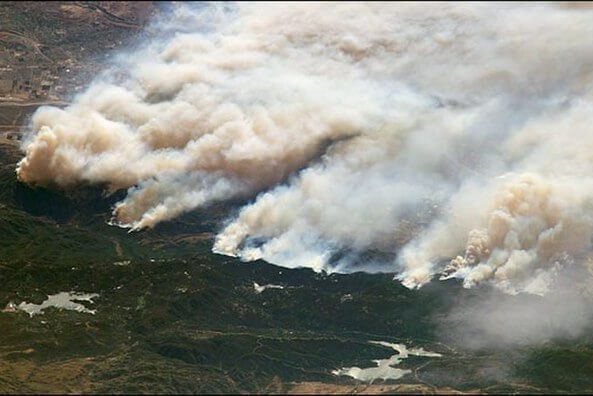
A recent report from the Fire Brigades Union (FBU) has sounded a stark alarm, declaring the UK to be “woefully underprepared” in confronting the escalating threat of wildfires exacerbated by climate change.
Government statistics revealed a staggering 72% increase in wildfires, totalling over 44,000 incidents in the past year.
The FBU has pointed fingers at both the government and the National Fire Chiefs Council, asserting that they have failed to formulate a cohesive national strategy to address this mounting crisis.
A spokesperson for the NFCC said it “has consistently made clear to government and fire service partners that the impact of climate change will continue to put huge pressure on fire and rescue services in the years ahead”.
The union’s concerns are substantiated by the undeniable impact of climate change on weather conditions conducive to wildfires, as noted by the United Nations’ Intergovernmental Panel on Climate Change (IPCC). Specifically, the prolonged and intense heat experienced in the UK during the summer of 2022 has intensified the likelihood of wildfires by depleting moisture from the ground and vegetation.
The FBU’s report highlights a critical issue of understaffing within fire services, forcing them to grapple with recent wildfires by leaving fire engines unused in stations and mandating off-duty personnel to work additional shifts. This strain on the workforce has resulted in on-site firefighters facing exhaustion. Shockingly, the report estimates a loss of 12,000 firefighter jobs since 2010, contributing to the vulnerabilities of the firefighting infrastructure.
Matt Wrack, the FBU’s general secretary, said: “We need urgent climate action. If we are to properly protect life and property from wildfires, the fire and rescue service needs significant investment.
“This means more firefighters, better equipped and trained, along with better planning, research and coordination.”
The government’s own report acknowledges an “exceptional increase” in outdoor fires last year, notably linked to the hot and dry summer conditions. July 2022 alone witnessed 21,246 outdoor fires, nearly tripling the figure from the previous year. Furthermore, wildfires encroached upon the “urban-rural interface,” causing destruction to around 95 buildings, including 16 homes in Wennington, London.
In response to these challenges, the FBU calls for the establishment of a comprehensive UK-wide wildfire strategy, emphasising the need for national standards across fire and rescue services. The current situation, characterised by what the FBU terms a “postcode lottery of wildfire response,” demands immediate attention.
The union advocates for improved recruitment and retention of retained firefighters in rural areas, coupled with increased central government investments in training, crew numbers, and personal protective equipment (PPE). Specifically, the introduction of body-worn physiological monitors for firefighters and specialised respiratory protection is proposed.
The Home Office, in its response, underscores that fire and rescue authorities are allocated £2.6 billion during 2023/24, leaving the decision on resource allocation to each authority. However, the FBU insists that a more unified and standardised approach, coupled with strategic investments, is imperative to adequately confront the escalating wildfire threat. The need for a cohesive national strategy becomes paramount to ensure the resilience of firefighting efforts across the UK.
A spokeswoman said the department was working closely with both the NFCC and the England and Wales Wildfire Forum, a multi-agency body, to “continue to improve our response to wildfires and reduce their impact”.
The NFCC said it was “extremely proud of the fantastic, professional response of UK firefighters and 999 control staff in tackling wildfires and protecting local communities”.
It said it would continue to ensure all future funding decisions are “fully informed by, and reflect, the current and future risks that fire services face, including the growing effects of climate change and the impact of wildfires, flooding and other events”.
——————————————————————————
At Natural World Fund, we are passionate about stopping the decline in our wildlife.
The decline in our wildlife is shocking and frightening. Without much more support, many of the animals we know and love will continue in their decline towards extinction.
When you help to restore a patch of degraded land through rewilding to forests, meadows, or wetlands, you have a massive impact on the biodiversity at a local level. You give animals a home and food that they otherwise would not have had, and it has a positive snowball effect on the food chain.
We are convinced that this is much better for the UK than growing lots of fast-growing coniferous trees, solely to remove carbon, that don’t actually help our animals to thrive.
This is why we stand for restoring nature in the UK through responsible rewilding. For us, it is the right thing to do. Let’s do what’s right for nature!
Donate today at https://naturalworldfund.com/ and join in the solution!

